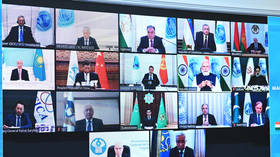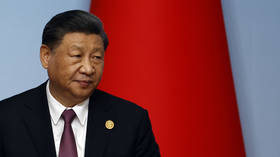You are using an out of date browser. It may not display this or other websites correctly.
You should upgrade or use an alternative browser.
You should upgrade or use an alternative browser.
Shanghai Cooperation Organisation (SCO) and Global South strategic cooperation
- Thread starter Strangelove
- Start date
Update on cscec work on the new Egyptian capital cbd
Acwa power got revolving credit from china construction bank for 3 years
Acwa power got revolving credit from china construction bank for 3 years
pretty important here. Despite what certain people in Washington thinks, you don't need Western money to lead industries. As long as you have great tech, people will invest in it. Could be the Saudis or Emiratis. Could be the Russians or southeast asians or people in mainland itself. And those that develop new sector techs, will not only get money, but also friends. Nobody wants to be left behind. Everyone is willing to get closer to the tech leaders to stay in the game
And that includes the Europeans. If Europeans see that China is the way for them to stay in the game, they will work with China
That's why we have a tech war
Eurasian economic and security bloc expands
Iran has become a full member of the Shanghai Cooperation Organisation, while Belarus will sign a memorandum on accession
Iran has become the ninth full member of the Shanghai Cooperation Organisation (SCO), upgrading its previous status as an observer of the Eurasian security and economic development bloc.
The accession took place on Tuesday during a virtual meeting of SCO leaders, organized by India, which holds the rotating presidency.
Iran has been a participant at summits since 2005 and applied for full membership in 2021. Last November, Tehran’s parliament ratified a draft law on joining the alliance.
“The authority and influence of our community keep growing stronger. The interest of other nations and international structures towards its activity is increasing,” Russian President Vladimir Putin remarked during the session. “They trust us and want our friendship and cooperation.”
Putin hailed Iran’s swift progress to full SCO membership. The goal of the forum is now to “help our colleagues integrate into the multifaceted work” done by it, he added.
The SCO, formed in the 1990s as the Shanghai Five, initially comprised China, Kazakhstan, Kyrgyzstan, Russia and Tajikistan. Uzbekistan joined in 2001, leading to the name change, and the most recent round of enlargement in 2017 saw India and Pakistan join.
On Tuesday, Belarus is expected to sign a memorandum on accession, a necessary step for an observer country to become an SCO member. Minsk applied for the procedure last year during a summit in Uzbekistan.
Aside from Belarus, Afghanistan and Mongolia currently have observer status, while over a dozen nations are viewed by the SCO as dialogue partners.
Xi hits out at ‘color revolutions’
External interference in the affairs of sovereign states must not be allowed, the Chinese leader says
Members of the Shanghai Cooperation Organization should resist outside attempts to stage uprisings, Chinese President Xi Jinping said on Tuesday in an address at the SCO’s virtual summit.
“It’s necessary to categorically oppose any attempts to interfere from the outside and inspire color revolutions under any pretext,” Xi stressed.
During his speech, the Chinese leader also criticized the practice of imposing sanctions without UN approval, and called on SCO members to increase their trade in national currencies.
The Shanghai Cooperation Organization is a Eurasian political, economic and security organization, which unites China, Russia, India, Kazakhstan, Kyrgyzstan, Pakistan, Tajikistan and Uzbekistan.
It’s currently world's largest regional bloc in terms of geographic scope and population. The SCO was expanded further during the current summit with the official inclusion of Iran.
Xi has spoken out against so-called ‘color revolutions’ on several occasions. Late last year, he stated that Beijing was “categorically opposed” to attempts to “undermine the peaceful life of people” under the guise of protecting human rights.
The term ‘color revolution’ has been used mainly to describe uprisings in post-Soviet states, with the goal of toppling governments that oppose the interests of the US and its allies, but has also been applied to countries outside the region. Most of the revolts have involved a large degree of support from US-funded NGOs and American intelligence agencies.
The Rose Revolution in Georgia in 2003 and Ukraine's Orange Revolution, which took place a year later, are two of the best-known examples.
Hope India not too silly to 'miss opportunities for fear of China': Global Times editorial
According to several Indian media reports, India did not sign the Shanghai Cooperation Organisation (SCO) Economic Development Strategy for 2030 because the document "had too many Chinese catchphrases." The document was a significant achievement of the SCO Summit in New Delhi and had been approved by the Heads of State Council. However, India, as the rotating chair of the organization, became an absentee.
Once again India acting as the spoiler in multilateral organizations like the SCO.
Once again India is the spoiler in multilateral organizations like the SCO.In fact, this strategic document isn't "dominated by China" at all. It was initially proposed by Tajikistan with the aim of promoting regional economic cooperation and integration, focusing on the entire region's development. Although the details of the document are not disclosed, it is in line with the consensus of regional countries in the general direction and reflects the collective interests of all member states. China, as a founding member, has provided many valuable new ideas for the development of the SCO. It would be abnormal if an economic development plan like this had no proposition from China. However, even this makes India feel "robbed of its limelight," which reveals the worsening "China hypersensitivity" symptoms in New Delhi.
India does not have the clout, the temerity even actual economic heft to derail any plans from the west lead by the U.S. since it feels that it needs access to western market and for immigration purposes for its people to come and work as well as settle. Whereas with China, India rightly or wrongly, it feels that they're on equal footing if not ahead in some key areas that's only obvious and pertinent to the Indians but not to everyone else. They can cite democracy (mother of Democracy as Indians love to proclaim often) the youngest population, the largest population, economic growth of 6% according to Indian ways of calculation (Harvard studies show that Indian GDP calculation shouldn't be trusted based on their erroneous methodology).Hope India not too silly to 'miss opportunities for fear of China': Global Times editorial
Once again India is the spoiler in multilateral organizations like the SCO.
India probably really pissed China and others off in the recent SCO meeting, more than just not signing the SCO Economic Development Strategy document. This flurry of news hints there are bigger rifts between India and China in the SCO.
A great interview with SCO insider.
A great interview with SCO insider.
India stirs the pot in Shanghai Cooperation Organisation
- New Delhi’s rejection of China’s Belt and Road Initiative is part and parcel of a looming infrastructure “war” and battle for influence in the Global South between the two nation
Last edited:
It's actually everyone in the SCO but India who agreed with China's BRI.India probably really pissed China and others off in the recent SCO meeting, more than just not signing the SCO Economic Development Strategy document. This flurry of news hints there are bigger rifts between India and China in the SCO.
A great interview with SCO insider.
India stirs the pot in Shanghai Cooperation Organisation
- New Delhi’s rejection of China’s Belt and Road Initiative is part and parcel of a looming infrastructure “war” and battle for influence in the Global South between the two nation
Let me be frank - India is like a spoilt brat who goes around ruining the fun of everyone in gatherings that has China in it, mainly due to India throwing childish tantrums around to spite on China's face because his parents (i.e. the British Empire) instructed India to hate China on a very deep, very personal level based on circumstances that India's parents has delicately crafted a long time ago.
He's right.
In fact - Russia did a very wrong (and stupid) move by naively believing that bringing India on board the SCO can work in Russia's favor to balance China's influence and prowess in the region - Just like the Soviet Union back then.
Now, who is the one that actually backs Moscow the most when Russia is forced to stand against the pressure of coercion from all of the Western world since late-February 2022? Please, Moscow. Wake. The. Fvck. Up.
And seriously, New Delhi. Please do us all one massive fvcking favor by Get. The. Fvck. Out. Of SCO.
Last edited:

